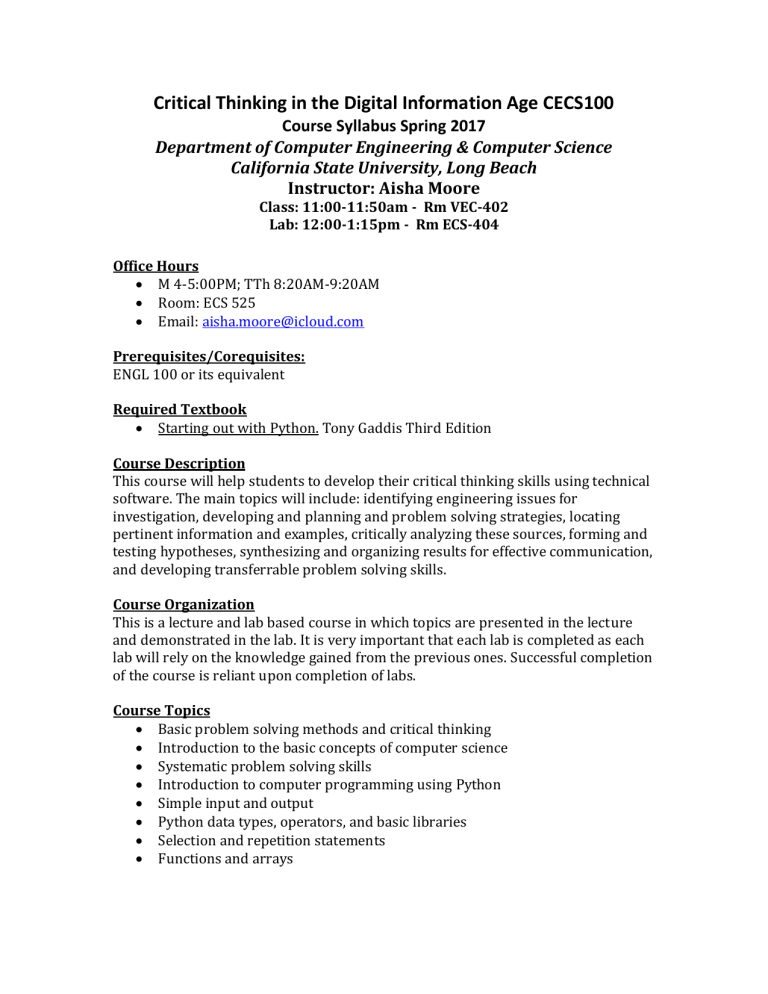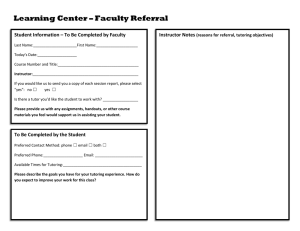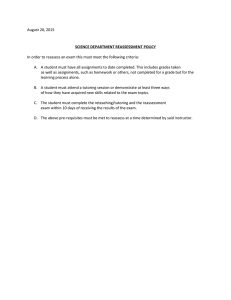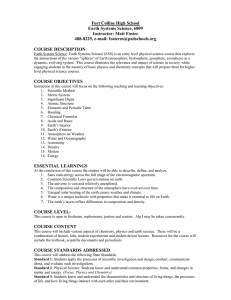
Critical Thinking in the Digital Information Age CECS100 Course Syllabus Spring 2017 Department of Computer Engineering & Computer Science California State University, Long Beach Instructor: Aisha Moore Class: 11:00-11:50am - Rm VEC-402 Lab: 12:00-1:15pm - Rm ECS-404 Office Hours • M 4-5:00PM; TTh 8:20AM-9:20AM • Room: ECS 525 • Email: aisha.moore@icloud.com Prerequisites/Corequisites: ENGL 100 or its equivalent Required Textbook • Starting out with Python. Tony Gaddis Third Edition Course Description This course will help students to develop their critical thinking skills using technical software. The main topics will include: identifying engineering issues for investigation, developing and planning and problem solving strategies, locating pertinent information and examples, critically analyzing these sources, forming and testing hypotheses, synthesizing and organizing results for effective communication, and developing transferrable problem solving skills. Course Organization This is a lecture and lab based course in which topics are presented in the lecture and demonstrated in the lab. It is very important that each lab is completed as each lab will rely on the knowledge gained from the previous ones. Successful completion of the course is reliant upon completion of labs. Course Topics • Basic problem solving methods and critical thinking • Introduction to the basic concepts of computer science • Systematic problem solving skills • Introduction to computer programming using Python • Simple input and output • Python data types, operators, and basic libraries • Selection and repetition statements • Functions and arrays Course Goals • Identify in the current media topics that are relevant to engineering analysis • Apply problem solving strategies to various engineering problems • Locate or develop sources of data in the media, internet and/or program output • Critically analyze data information for logical validity and applicability • Form and test hypotheses • Effectively communicate results • Exhibit problem solving skills Course Policies and Requirements Students are expected to attend all sessions, participate in all class discussions, read assigned materials, complete exams as scheduled, and turn in all assignments on time. Failure to do so may result in the loss of points. Grading Scale Letter Grade 90-100 A Item Individual Assignments Group Assignments Midterm Final Project Final Total Grading Scale 80-89 70-79 B C 60-69 D 0-59 F Weight 20% 20% 20% 20% 20% 100% Lab Assignments and Homework Late assignments will be deducted 5% for every calendar day the assignment is late, and not accepted after a week. Homework and lab assignments should be submitted through BeachBoard. I will not accept homework assignments/lab assignments via email. Tentative Calendar Week Date 1 1/24/17 1/23/17 2 1/31/17 2/2/17 Description Identifying and defining problems Ch. 1- Introduction to Computers and programming Overview of logic and design Identify problem solving steps and tools Flowcharts and pseudocode 3 4 5 6 7 8 9 10 11 12 13 14 15 16 Finals Week 2/7/17 2/9/17 2/14/17 2/16/17 2/21/17 2/23/17 2/28/17 3/2/17 3/7/17 3/9/17 3/14/17 3/16/17 3/21/17 3/23/17 3/28/17 3/30/17 4/4/17 4/6/17 4/11/17 4/13/17 4/18/17 4/20/17 4/25/17 4/27/17 5/2/17 5/3/17 5/9/17 5/11/17 5/15/175/20/17 Ch. 2- Input, Processing, and Output Python basics (input/output), Python arithmetic expressions Ch. 2 Ch. 3 Decision Structure and Boolean Logic Ch. 3 Ch. 4- Repetition structures Quiz 1 Ch. 5- Functions Ch.5 Midterm Ch. 6- File and Exceptions Ch. 7 List and Tuples Quiz 2 Ch. 7 Ch. 9 Dictionaries and Sets Ch. 10- Classes and Object-Oriented Programming Quiz 3 Ch. 10 Ch. 11 Inheritance Fall Break & Thanksgiving Holiday Ch. 12 Recursion Quiz 4 Ch. 12 Review for Final Final Exams Diversity Learning to work with and value diversity is essential in every program. Students are required to act respectfully toward other students and instructor throughout the course. Students are also expected to exhibit an appreciation for multinational and gender diversity in the classroom and develop management skills and judgment appropriate to such diversity in the workplace. Accommodations Students with disabilities who need reasonable modifications, special assistance, or accommodations in this course should promptly direct their request to the course instructor. If a student with a disability feels that modifications, assistance, or accommodations offered are inappropriate or insufficient, he/she should seek the assistance of the Director of Disabled Student Services on Campus. Disabled Student Services is a student support program within the Student Services Division. The Disabled Student Services office is located on the 2 nd floor in the Administration Building, room SS/AD 270 Academic Dishonesty, Cheating & Plagiarism Ethical behavior in the classroom is required of every student. Students are also expected to identify ethical policies and practices relevant to course topics. Cheating and plagiarism will not be tolerated in this course. Any individual caught cheating on quizzes, homework, labs, projects, or the final exam will be punished to the full extent allowed under University regulations. Please note: plagiarizing another person’s work is cheating. At a minimum, any student caught cheating will receive no credit for the work concerned, and will receive a reduction of one letter grade from their final course grade. Academic dishonesty includes the following actions, as well as other similar conduct aimed at making false representation with respect to the student's academic performance: cheating, inventing false information or citations, plagiarism and helping someone else commit an act of academic dishonesty. Serious consequences including forced withdrawal from the course and removal from the university follow upon academic dishonesty. See student handbook for details. Withdrawal Policy You are responsible for completing the course unless you withdraw from it officially. It is your responsibility to withdraw from any course that you do not intend to attend and complete. If you fail to withdraw by the deadline date, you will be assigned a U as your final grade. Withdrawal after the first two weeks of classes requires the signatures of the instructor and the department chair, and is allowed only if there are compelling circumstances. During the final three weeks of classes, withdrawals are not permitted except in cases in which the circumstances necessitating withdrawal are clearly beyond the student’s control (e.g. serious illness), and the assignment of an I (incomplete) as the final grade is not practical. Ordinarily, such withdrawals involve total withdrawal from the University. See the Schedule of Classes for further details about the University’s withdrawal policy. I will normally honor drop requests where permitted by University policy. COE Tutoring Take advantage of free peer tutoring to keep up your grades in the most challenging classes. Tutoring is available for undergraduate engineering students in departmental courses for Electrical Engineering, Mechanical & Aerospace Engineering, Civil Engineering, Computer Engineering/Science, and Chemical Engineering. Tutoring is on a first-come-first-serve, walk-in basis. Tutors are available MondayThursday in the Fall and Spring terms. All tutoring sessions take place in the Engineering Student Success Center (ESSC) in EN2, Room 300 between the hours of 9:00 a.m. – 6:00 p.m. Visit the website for detailed tutoring schedules: http://web.csulb.edu/colleges/coe/views/essc/academic_success/engineering_tuto r.shtml#asp_ETP Important Dates Date 1/23/17 3/27-4/2/17 3/31/17 5/12/17 5/15-5/20/17 5/23-5/26/17 5/26/17 Event Details First Day of Spring Semester, Classes Start Spring Break (No Classes) Cesar Chavez Day (Campus Closed) Last Day of Spring Classes Final Exams Commencement Ceremonies Last Day of Spring Semester




